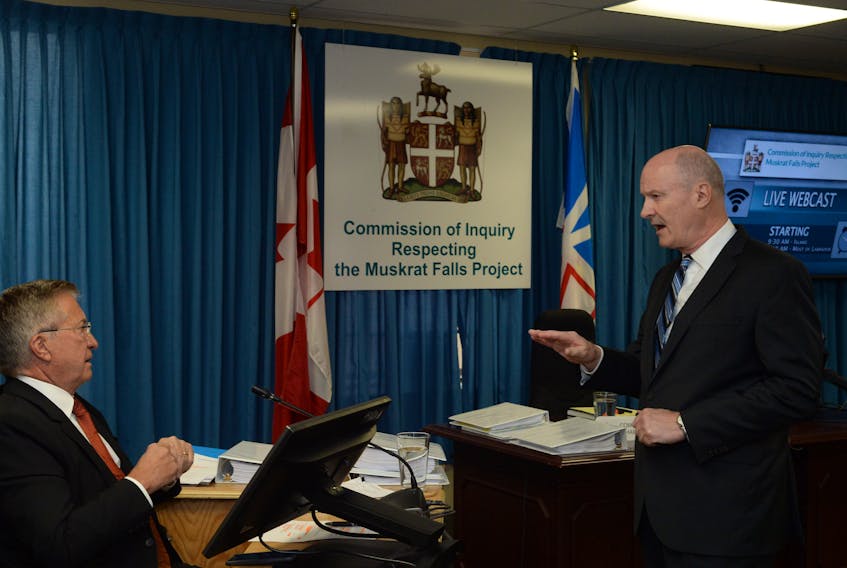Attention was paid Monday to Danny Williams’ response to personal critics and criticisms of the Muskrat Falls hydroelectric project, but while testifying at the Muskrat Falls Inquiry, the former premier also spoke about why the province did not reach a deal of some kind with Quebec instead of pursuing its own energy project.
In response to questions from inquiry co-counsel Barry Learmonth, Williams described early work undertaken before the decision to chase energy independence, instead of another commercial arrangement for power with Hydro-Québec.
Williams opposed the earlier iteration of a lower Churchill River hydro development with Quebec, proposed under Liberal premier Roger Grimes. Grimes had put forward a power export project, one Williams felt Newfoundland and Labrador did not have enough control over.
There were larger, existing power assets on the river at Churchill Falls, but he felt strongly any deal involving that larger facility would need to include redress for the imbalance in benefits being paid out for power under the contract governing the jointly owned facility.
RELATED STORIES:
Critics not convinced after Williams’ testimony
We can be ‘really proud’ of Muskrat Falls megaproject, Williams tells inquiry
Auditors bring Muskrat Falls as ‘best option’ into question
He said he felt addressing the contract was important to the people of the province.
Newfoundland and Labrador pursued changes to the Churchill Falls deal, but with no sign of a resolution and ongoing legal challenges when Williams left provincial politics.
Williams described the attempt to also access more power from Churchill Falls. Newfoundland and Labrador has a block of power available, but tried for more, for possible use in local economic development. The power would only be made available by Hydro-Québec at the “going rate,” he said.
That option wasn’t considered worth pursuing, given the pricing and that it also didn’t solve the continued burning of fossil fuels on the island of Newfoundland and eventual shortfall of power expected there.
Williams spoke about the Government of Newfoundland and Labrador’s attempt to make use of Quebec transmission lines, potentially moving power to and from the province through that route. An application seeking open access for transmission was denied.
“They’ve basically tried to cut us out every step of the way,” he said of Hydro-Québec, when also addressing the utility’s move in 2009 to purchase NB Power assets – a move he publicly opposed at the time, fearing it was an attempt to control Atlantic Canada power, leading to possible new roadblocks to the transmission of any future power from Newfoundland and Labrador to outside markets.
He said Hydro-Québec wasn’t interested in a new competitor in the region.
When the NB Power sale was proposed in 2009 (before being halted in 2010), the Globe and Mail reported the Quebec utility had approached Prince Edward Island and Emera subsidiary Nova Scotia Power, and was “pushing to gain control of more of Eastern Canada’s power grid.”
Williams said he had considered a power agreement of some kind possible, until the decision in 2010 came down from the Régie de l’énergie (Quebec’s energy regulator) denying Newfoundland and Labrador open access to transmission.
“That was the last hope we had that we could go through Quebec, work with Quebec,” he testified, saying he was angry in the wake of the decision.
He considered the Muskrat Falls project as a way to eliminate “the Quebec factor” and avoid tying the identified power need in Newfoundland (as forecast by Newfoundland and Labrador Hydro) to what he described as a lopsided Churchill Falls deal.
“Going it alone, that’s a statement that was made, but I mean basically at the end of the day we really didn’t go it alone. We partnered with Emera and we partnered with the Aboriginal groups. In essence, the (loan) guarantees is a partnership of sorts with the federal government. So ‘leading it alone’ probably should have been the better term,” he said of the plan that emerged for Muskrat Falls and addition of new transmission lines through Newfoundland and Labrador.
He said repeatedly the Muskrat Falls project was not pursued at all costs.
He spoke in support of the work of former Nalcor Energy president and CEO Ed Martin, referring to him as “extremely competent, thorough and ethical” in his work, following through on the province’s 2007 energy plan and pursuing the different options for electrical power.
Williams also said he trusted Nalcor Energy staff in the calculation of risk, in developing cost estimates for the project. He trusted them to disclose any early, significant changes that didn’t become apparent in his own questions to Crown corporation representatives.
Questioned about any involvement after leaving his political seat, he denied ever having injected himself into political and project decision-making after the fact.
The position he established for the province continued to the Muskrat Falls project sanctioning. A “backgrounder” attached to a news release issued on the 2012 sanctioning was titled “controlling our future” and refers to the province’s future “energy independence.”
The Muskrat Falls hydroelectric project was originally estimated to cost $6.2 billion. That price now stands at an estimated $10.1 billion, not including financing costs, as construction continues. The full cost is estimated to be $12.7 billion.









